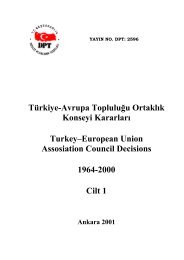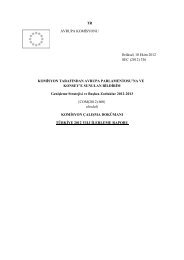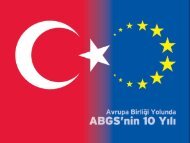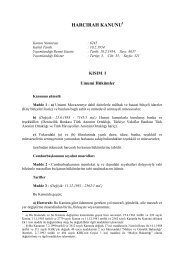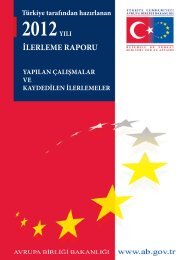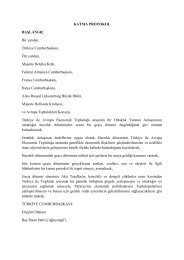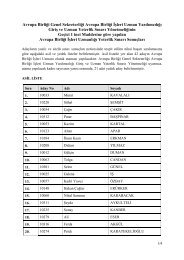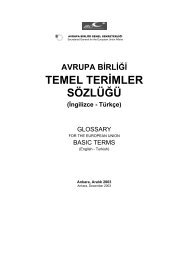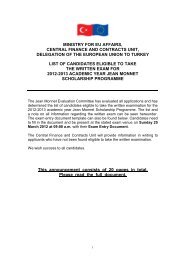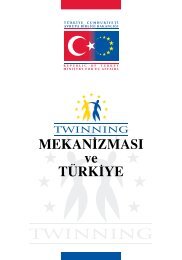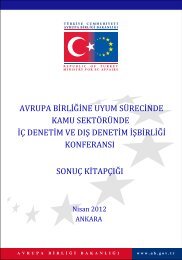2010 ilerleme raporu - Avrupa BirliÄi BakanlıÄı
2010 ilerleme raporu - Avrupa BirliÄi BakanlıÄı
2010 ilerleme raporu - Avrupa BirliÄi BakanlıÄı
Create successful ePaper yourself
Turn your PDF publications into a flip-book with our unique Google optimized e-Paper software.
stage. The finalization of a roadmap on asylum and migration is key. The Turkish institutions<br />
have only limited capacity and, most importantly, no ownership of the refugee status<br />
determination process for non-European asylum seekers. Thus the UNHCR, despite not<br />
having formal status in Turkey, is virtually the sole authority capable of carrying out and<br />
managing asylum procedures.<br />
It remains a key priority to ensure equal and fair access to asylum procedures, to shorten,<br />
albeit with the limited existing capacity, the waiting time as well as to give would-be asylum<br />
seekers full access to legal aid and UNHCR staff.<br />
Progress in the work towards the establishment of a country of origin and asylum case<br />
management systems, and to facilitate the possibility for civil society organisations to<br />
cooperate with the administration in providing assistance to refugees and migrants is also key.<br />
A number of civil society organisations working in the area of asylum and migration came<br />
together on 15 March <strong>2010</strong> and founded the ‘Turkey Refugee Rights Coordination’.<br />
There has been little progress on visa policy. In August <strong>2010</strong>, Turkey revised its policy as<br />
regards duration of stays allowed for 90 days within 180 days, in line with EU acquis.<br />
However, Turkey does not apply a uniform policy towards all EU citizens as regards the visa<br />
obligation. Currently, citizens of 12 EU Member States are required to hold a visa to enter<br />
Turkey, which can be obtained at the Turkish borders. Citizens of the other 15 Member States<br />
are exempted from the visa obligation for a short stay of up to 90 days.<br />
Turkish passports with biometric security features were put into use on 1 June <strong>2010</strong>. Visa<br />
issuing is now processed on-line among the Consular Offices and the Ministry of the Interior.<br />
Introduction of new Turkish visa stickers with higher security features was further delayed.<br />
Airport transit visas remain to be introduced. No administrative initiative took place for<br />
gradually abolishing the issuance of sticker- and stamp-type visas at borders. Turkey agreed<br />
on visa exemptions with, Libya and Jordan in December 2009, Lebanon in January <strong>2010</strong>,<br />
Russia in May <strong>2010</strong> and Tanzania and. Similar agreements with Syria in October 2009, Serbia<br />
in July <strong>2010</strong> and Cameroon, published in July <strong>2010</strong>, exclude ordinary passport holders. Some<br />
of these countries are on the EU’s negative list.<br />
Overall, alignment with the acquis in this area is at a very early stage.<br />
On external borders and Schengen, limited progress has been achieved. The task force for<br />
external borders meets every two months and prepares a draft roadmap for harmonising the<br />
border management system with EU standards as part of the efforts to implement the national<br />
action plan on integrated border management (IBM). A coordination board for IBM has been<br />
established in May <strong>2010</strong> by Prime Ministerial decree to create an official follow-up<br />
mechanism at decision-making level to screen progress towards achieving the target of IBM.<br />
The board is also tasked with developing further policies and strategies in the area. In-service<br />
training on IBM was delivered to all sub-governors, despite the delays in adopting the<br />
proposed legislative amendment currently pending in the Parliament on expanding the tasks<br />
of the deputy governors acting as administrative heads of the border agencies.<br />
Inter-agency cooperation remains a key issue to be developed pending the reform process. For<br />
instance, efficient and coordinated use of databases and risk analysis at the borders are<br />
missing elements for integrated border management. Measures are required to deploy more<br />
trained staff and additional border check equipment at border crossing points to prepare for<br />
professionalised border management. Further efforts are needed to transfer border control<br />
tasks to a new border security agency; the current agencies need to be strengthened at the<br />
EN 83 EN




